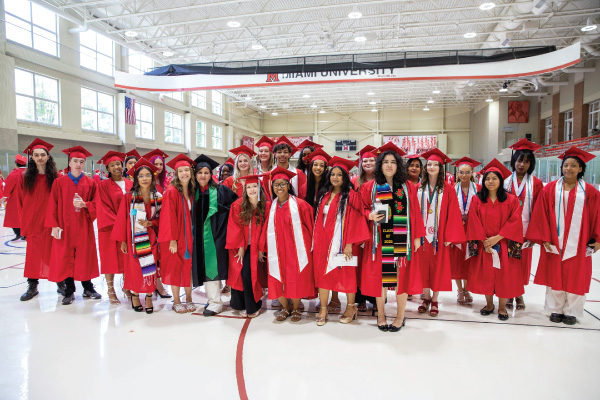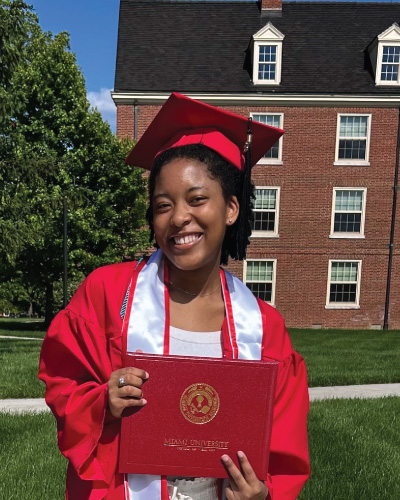Students from 9 high schools graduate from Miami University's Early College Academy
Campus experience, opportunity for free associate degree are popular draws

Students from 9 high schools graduate from Miami University's Early College Academy
Since its launch in 2022, the Early College Academy (ECA) program at Miami University Regionals has seen burgeoning enrollment as more area high school students discover the opportunity for getting ahead in their career and saving money by earning an associate degree at no cost before leaving high school.
This spring, nearly 75 students from nine area high schools will graduate with their high school diploma and an associate degree in general studies, up from two high schools and fewer than 30 students last year. More than half of these graduates will be continuing their education at Miami University, either at the Regionals or at Oxford, said Laurel Gilbert, interim director of Dual Credit Programs.
While many early college high school programs offer students the chance to get ahead in their college credits, Miami’s program is unique in bringing its ECA participants to the regional campuses to take part in college level courses with college professors and students, and enabling them to graduate with a two-year degree in hand.
Students say the experience of being on campus and exploring opportunities for academic enrichment, research, social connections, and interpersonal relationships with professors has made a big difference in their educational journey, opening doors.

Uncovering new strengths
Alex Marcum, a graduate of Franklin High School, said as a sophomore he thought about attending a technical school after graduation. But when the ECA program was announced at Franklin, he knew it was the right choice for him.
“I thought there’s no point staying in high school if you can start learning something you’re interested in now at college,” said Marcum, who will start at the Oxford campus next fall to study marketing in the Farmer School of Business.
Coming to the Regionals each day instead of reporting to his high school definitely changed him, Marcum said. The greater independence of a campus was exhilarating and also a little intimidating at first, he admitted, compared to the more structured environment of his high school.
“Learning to manage your schedule was a big skill I learned from being on a campus,” he said. “It was a change to know I controlled my time, and I managed my success.”
He said he also noticed a change to some of his academic skills.
“My critical thinking and my writing skills have improved dramatically since being here. I improved in ways I never thought I would.”

Successfully managing high school and college at the same time
For Kaydence Young, a graduate of Middletown High School, juggling high school commitments and her classes at Miami Regionals was critical because of a busy schedule of activities at her high school. She continued her participation in cheerleading, orchestra, softball, and was even president of her school’s National Honor Society chapter.
“At first, it was difficult to juggle two different atmospheres and locations, but I adapted well,” said Young, who graduated near the top of her high school class and was captain of her cheerleading team during each of her four years of high school.
Accustomed to success, Young chose ECA because she wanted to get a jump start on her college plans. She now hopes to eventually attend medical school and become a radiologist. She will attend Ohio State University in the fall.
“It feels like a weight has been lifted off my shoulders,” she said of graduating with her associate degree. “I’m halfway there.”

Finding advanced opportunities before leaving high school
Abigail Evans, who graduated as valedictorian of her class at Winton Woods High School, said she was happy to immerse herself in the activities of campus life at Miami Regionals rather than trying to juggle high school extracurriculars at the same time.
“I wanted more of an academic challenge and a more mature environment,” she said. “I was glad to be on a college campus.”
One of the opportunities Evans tapped was the chance to do research in environmental biology with one of her professors over the summer before she graduated — an opportunity that very few high school students get. She was able to create a presentation poster on her findings for a professional event.
“I did a presentation for the Geological Society of America on cave sediment in Puerto Rico,” she said. “I was nervous because everyone there was on such a high level. But it was a really good experience. It made me realize I might be interested in paleo science. It’s good to see where (my studies) can take me.”
Next fall, Evans plans to continue her education at Miami’s Oxford campus, where she has decided to study biochemistry.
Improving pathways for underrepresented students
Programs such as ECA are part of nationwide efforts to increase college graduation rates for underrepresented groups and first-generation college students. Among ECA rising seniors, 80 percent are first-generation college attendees and 36 percent are from underrepresented groups, Gilbert said. Overall, roughly 66 percent of ECA participants have been first-generation college students.
“They are taking in-person classes with other college students,” Gilbert said. “We integrate them into the campus experience. But we also have dedicated staff to assist them along the way, so they are never left to figure it out without help.”
Participants have dedicated study space and weekly check-ins with coaches who help them navigate everything from course scheduling to study tips. There are also academic supports, such as tutors, to prevent students from becoming overwhelmed by unfamiliar material.
“The vast majority of our ECA students are successful and go on to complete a four-year degree,” Gilbert said. “It really has been an effective program.”
Students such as Leila Johnson of Middletown High School, who plans to attend Ohio State University in the fall, said ECA helped college become more affordable, and therefore achievable, and changed her outlook on the future.
“ECA took a lot of the stress away from paying for college by letting me earn college credits for free. It also gave me a real feel for what college is like and helped me grow more independent and focused,” she said. “I feel more prepared and confident about my future now.”
